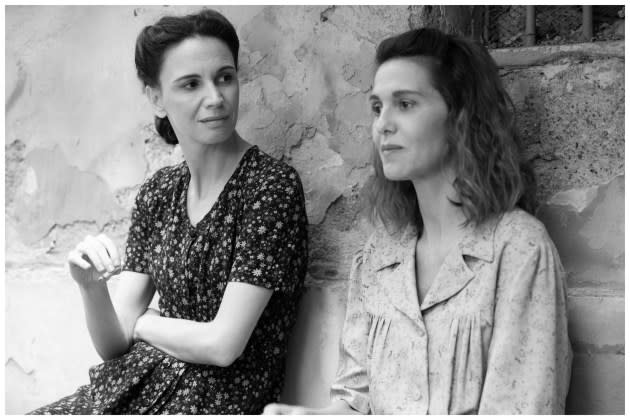Paola Cortellesi Talks 1940s Italy Women’s Rights Drama ‘There’s Still Tomorrow’ + First Clip – Rome Film Festival
- Oops!Something went wrong.Please try again later.

Italian actress and screenwriter Paola Cortellesi’s directorial feature debut There’s Still Tomorrow (C’è Ancora Domani) opened the 18th Rome Film Festival on Wednesday evening.
Set in the lead up to Italy’s historic post-World War Two institutional referendum on June 2, 1946, in which women were allowed to vote for the first time, the quirky black-and-white work mixes drama with comedy elements, and a period feel with modern music tracks.
More from Deadline
Oscars: Italy Submits 'Io Capitano' For Best International Film
Roman Polanski's 'The Palace' Sells To Key Europe Territories Ahead Of Venice Premiere
Cortellesi stars as protagonist Delia, a downtrodden Rome housewife run ragged by her violent husband (Valerio Mastandrea) and unruly young sons as she juggles odd jobs in between cooking, cleaning as and caring for her misogynist bedridden father-in-law.
In the backdrop, she frets over what the future holds for her teenage daughter who has fallen for a local boy with a possessive streak.
The feature marks a departure for Cortellesi, who is a household name in Italy, best known as a singer and comic actress, with credits including hit comedies such as Do You Know Claudia?, Piano, Sola, Escort in Love and the Like a Cat on a Highway franchise.

Inspiration for There’s Still Tomorrow came two years ago as Cortellesi was reading her young daughter a children’s book recounting the evolution of women’s rights.
“She was incredulous about the stories of how women were treated in the past. At first, I was relieved because I thought it was a sign that times had changed. Then, I started thinking, if she’s not aware, teenage girls probably don’t know about it either,” she says.
The actress, who has co-written a number of features in which she has starred, got together with long-time collaborators Furio Andreotti and Giulia Calenda to write a film capturing the reality of ordinary women back in 1946 as they were on the cusp of their first democratic vote.
“What I was interested in was exploring was the day-to-day discrimination and domestic violence of that time,” she says. “It’s not about the big female figures like Nilde Lotti, I wanted to celebrate the forgotten women like my grandmother and great-grandmother.”
“It’s not based on a true story, but it’s inspired by their lives and the many women like them, stories heard in the courtyard, because everybody knew everything about everybody… there was not an ounce of privacy… There’s a generation of women who grew up like this, excepting their lives, never questioning the status quo.”
Cortellesi says shooting the film in black-and-white seemed like natural choice and also tapped into her love of neorealismo rosa (pink neorealism).
“When my relatives told me stories about that period, I always kind of imagined them in black and white… I also wanted to connect with a school of cinema I love known as neorealismo rosa, which is different from the neorealismo of Rome, Open City or Bicycle Thieves, in that the characters and settings are realistic, but the story has elements of romance or comedy,” she explains.
Cortellesi spent three weeks rehearsing with her cast and doing meticulous screen tests for the different shades of black and white in the film, before shooting on location on the streets of Trastevere in Rome and on set at Cinecittà.
The actress suggests that while the violence and discrimination against women captured in the film seems to belong to another era, they have not been eradicated from Italian society.
“Things have changed, and we’ve made progress but there’s still a toxic mentality in some quarters. Femicide is still a problem in Italy. According to a recent study, one woman is murdered by a man, often an ex who can’t except they’ve left them, every 72 hours,” she says.
The feature is produced by Mario Gianani and Lorenzo Gangarossa at Rome-based Fremantle film and production company Wildside and Vision Distribution, a Sky Company, which is also the Italian distributor and is handling international sales.
Wildside has produced a number of features in which Cortellesi has starred and also co-written the screenplay.
“One day Mario said to me, ‘Paola, I like your way of working and what you do, we should think about making a film together,” recounts Cortellesi.
“My previous work that I wrote and played in, which is intelligent but more mainstream,” she continues. “When I pitched him this film, explaining it would be a black-and-white film about domestic violence, which also makes you laugh, I think he was taken aback… but he go behind it, even if it was not an easy film to make… He trusted me.”
Vision Distribution will release the film in Italy on October 26.
Best of Deadline
2023-24 Awards Season Calendar - Dates For Oscars, Emmys, Grammys, Tonys, Guilds & More
Venice Film Festival 2023 Photos: The Red Carpet Premieres & Closing Ceremony Winners
Sign up for Deadline's Newsletter. For the latest news, follow us on Facebook, Twitter, and Instagram.

